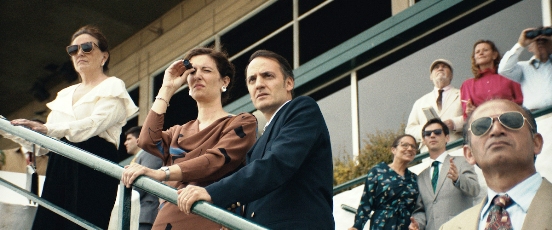 A film about an agent of a Swiss bank working to support the military dictatorship in 1980s Argentina reveals how little it takes for people to look away from evil when being silent is to their advantage.
A film about an agent of a Swiss bank working to support the military dictatorship in 1980s Argentina reveals how little it takes for people to look away from evil when being silent is to their advantage.
Already we feel a sense of constriction, an oppressive claustrophobia and holding in of emotions, before we even know exactly what we’re looking at in Swiss director Andreas Fontana’s debut film, Azor.
A man and woman arrive in Argentina, and gradually we learn that the man, Yvan De Wiel, played by Fabrizio Rangone, is a Swiss banker, and the woman is his wife Inès, played by Stéphanie Cléau. Yvan is there to replace one of his business partners at the bank named Réné, who had gained prominence among the bank’s super-wealthy clients in Buenos Aires, but who recently departed under mysterious circumstances. Réné was apparently both popular and trusted by these secretive clients, so Yvan is worried that they will miss their former banker too much to put their trust in him. And no one can say why or how Réné left, but there are hints of a possible transgression, something that might have alarmed the government.
Yvan is a very quiet, contained, diplomatic type. Privately he has doubts about his ability to handle this new assignment, but Inès is always there to strengthen his backbone, and to remind him of how careful he needs to be, while her presence on the trip is ostensibly to put their fabulously wealthy customers, and their wives, at ease, as if this were merely a social visit.
The director, Fontana, doesn’t give the audience much information on what’s going on. We have to stay on our toes and pay close attention, just like Yvan and Inès, and after some time we discover that the story is taking place in the early 1980s, when Argentina was ruled by a military junta that had recently taken power in a coup. The government is waging what eventually came to be known as the “dirty war,” a violent purging of leftists, liberals, intellectuals, and anyone else opposing the policies of the dictatorship.
Near the beginning of the film, the car taking the Swiss couple from the airport is delayed at a checkpoint, and they see two young men up against a wall, being searched by police. We almost expect to see them shot, but this film is all about drawing conclusions from what we don’t see or hear. The car goes on and we never find out what happened to the men, if anything.
Yvan’s clients are from the ruling class of Argentina. They live in luxurious villas and hold meetings in expensive hotels with swimming pools and waiters serving cocktails. Clearly, the Swiss bank that employs Yvan is financing the junta and all its activities, but everything is shrouded in vague phrases and euphemisms.
Yvan’s studied politeness is a marvel of stone-faced restraint. The title of the film, Azor, we discover, is a kind of code the couple adopted from the banking world of Geneva, meaning “to be careful and quiet.”
There’s an unnerving air of menace throughout the movie, which you might expect to explode into some kind of thrilling climax, but instead just keeps simmering, and this is a major element in the thinking of Fontana and his co-screenwriter, Mariano Llinás, about the reality of societies under dictatorship, as opposed to the more dramatic effects of fiction. Crucially, the film shows how ordinary people doing business can agree to participate in evil—by being silent and pretending they don’t see.
Yvan starts to piece together a possible reason for Réné’s disappearance when he visits the man’s deserted flat and sees a list of clients with one unfamiliar name at the end: Lazaro. Who or what is Lazaro? He will need to find out, but without disturbing the delicate power relations between him and his hosts.
The film’s style is remarkably tense, yet understated. We, the audience, must read between the lines, and notice especially the behavior of the women in this rarefied upper class world. They unintentionally reveal more of the truth in their casual conversations than the men. The political vision of this excellent film is stark and eerie in its portrayal of a society plunged in shadow, but which cunningly hides the darkness with every word and gesture. In Azor, we learn that silence is one of the most effective forms of oppression.

Written and directed by native Australians, a new film provides a glimpse into the painful history of Australia’s brutal treatment of its original native...

In 1913 Budapest, a young woman searches relentlessly for the secrets of her own family, in a film that dramatizes a premonition of the...

Ken Loach and Paul Laverty present another great film about working class life: a portrait of an English family having to find a way...